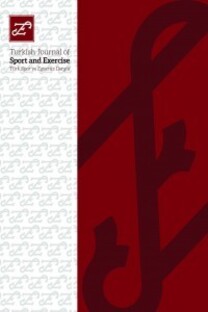Examination of Physical Education Teachers’ Feelings, Attitudes and Perceptions Towards Integration/Inclusion of Autistic Students
Examination of Physical Education Teachers’ Feelings, Attitudes and Perceptions Towards Integration/Inclusion of Autistic Students
___
- 1.Ahmetoğlu, E., Ünal, M, A., & Egin, Y, D. (2016). Kaynaştırma Uygulamalarının Başarısını Etkileyen Etmenler Ölçeği’nin Geliştirilmesi. Trakya Üniversitesi Eğitim Fakültesi Dergisi. 6 / (2). 167-175.
- 2.Akdenk M, Ağaoğlu S.A., İmamoğlu O. (1997) Türkiye’deEngelliler İçin Uygulamalı Spor Eğitimi Modeli, Antalya Uluslararası Engellilerde Spor Eğitim Sempozyumu, (179-191), Antalya.
- 3.Çolak, M., & Çetin, C. (2014). A Research on Teachers’Attitudes towards Disability. Dokuz Eylül University Journal of Faculty of Economics and Administrative Sciences. 21: (1), 191-211.
- 4.Dolapci, S. (2013) Teacher Candidates’ Perceptions of Self-Efficacy and Perspectives on Inclusive Education. Master Thesis. Izmir: Dokuz Eylül University Institute of Educational Sciences, Department of Special Education.
- 5.Engin, A. O., Tösten, R., Kaya, M. D., & Köselioğlu, Y. S. (2014). Evaluation of Primary School Teachers’ Attitudes andViews on Inclusive Practice (The Case of).
- 6.Ertunç, N, E. (2008). Evaluation of the Knowledge Levels of Inclusive Education of Physical Education Teachers inInclusive Education in Secondary Level and Perspectives of Students with Disabilities in their Classes. Master Thesis.Ankara: Gazi University Institute of Educational Sciences,Department of Physical Education and Sports Teaching.
- 7.İnce, G. (2017). Otizm spektrum bozukluğu olan çocuğa sahip ebeveynlerin spor ile ilgili görüşleri. Ankara Üniversitesi Eğitim Bilimleri Fakültesi Özel Eğitim Dergisi, 18, (1), 109-124.
- 8.İnce, G. (2017). Parents’ opinions about sports with childrenwith autism spectrum disorder. Ankara University Faculty of Educational Sciences Special Education Journal, 18: (1), 109-124. 5.
- 9.Kayhan, N., Şengül, A., & Akmeşe, P. P. (2012). Examinationof Primary and Secondary School Teacher Candidates’ Views on Inclusion. Journal of Education and Training Research, 1: (3), 268-278.
- 10.Kırımlıoğlu, H., Esentürk, O., İlhan, E. L., Yılmaz, A., &Kaynak, K. (2016). İlköğretim, Özel Eğitim ve RehabilitasyonMerkezi Öğretmenleri İle Beden Eğitimi ve Spor ÖğretmenAdaylarının Zihinsel Engelli Bireylerin Fiziksel Egzersize Katılımlarının Etkilerine Yönelik Farkındalık Düzeylerininİncelenmesi. Manas Sosyal Araştırmalar Dergisi. 5 / (4). 231-244.
- 11.Koparan, Ş. (2003). Sports in Children with Special Needs. Uludag University Faculty of Education Journal, 2003; 16: (1), 153-160.
- 12.Lermi, E. (2016). Examination of the Participation of Students with Autism in Physical Education Course in Inclusive Environment from the Perspective of Physical EducationTeachers and Parents. Master Thesis. Istanbul: Gedik University Institute of Health Sciences, Department of Physical Education and Sports Sciences.
- 13.Morris, L. R., & Schulz, L. (1989). Creative play activities forchildren with disabilities: a resource book for teachers and parents. Human Kinetics, PO Box 5076, Champaign, IL 61825-5076; toll-free.
- 14.Onur, M. (2009). Evaluation of the attitudes of guidance teachers towards main streaming education (Kağıthane towncase). Master Thesis. Istanbul: Beykent University SocialSciences Institute, Department of Business Management. 9.
- 15.Özdemir, H. (2010). Investigation of Preschool Teachers’Views on Inclusive Practice. Master Thesis. Edirne: Trakya University Institute of Social Sciences, Department of PrimaryEducation. 10.
- 16.Özer, D., Baran, F., Aktop, A., & Nalbant, S. (2006). BedenEğitimi Öğretmenlerinin Zihinsel Engelli Çocuklara İlişkinTutumlarının İncelenmesine Yönelik Bir Ön Çalışma. Gazi Beden Eğitimi ve Spor Bilimleri Dergisi, XI/1, 3-8.
- 17.Özer, D., S. (2013). Physical Education and Sports forDisabled People. Ankara: Nobel Academic Publishing.
- 18.Özkuluoğlu, F. (2015). Beden Eğitimi Öğretmen Adaylarının Özel Gereksinimli Öğrencilerin Kaynaştırma ProgramlarınaYönelik Görüşlerinin Değerlendirilmesi. Dokuz Eylül Üniveristesi Eğitim Bilimleri Enstitüsü Özel Eğitim Anabilim Dalı, Özel Eğitim Bölümü, Yüksek Lisans Tezi. İzmir.
- 19.Pamuk, Y. (2016). Classroom teachers’ Views on main streaming education. Master Thesis. Izmir: Dokuz EylülUniversity Institute of Educational Sciences, Department of Primary Education.
- 20.Sarı, H., & Bozgeyikli, H. (2003). An analysis of prospectiveteachers’ attitudes towards special education: a comparativestudy. Selçuk University Journal of Social Sciences Institute,9:(2), 183-203.
- 21.Sarı, H., & Pürsün, T. (2016). Effective Inclusive Integration in Special Education. Ankara: Nobel Academic Publications &Atlas Publishing.
- 22.Seçer, F. (2011). Examining the attitudes of classroom teachers towards interpersonal self-efficacy beliefs in terms of variousvariables. Master Thesis. Konya: Selçuk Üiversitesi.
- 23.Segall, M. J. (2007). Inclusion of students with autismspectrum disorder: Educator experience, knowledge, and attitudes. Unpublished master thesis, University of Georgia, Athens, Georgia.
- 24.Soyyiğit, T. (2013). Investigation of the Relationship Between Classroom Teachers’ Value Preferences and Their Attitudes towards Inclusion (The Case of Pendik District, Istanbul). Master Thesis. Istanbul: Yeditepe University Institute of Social Sciences, Department of Educational Administration and Supervision.
- 25.Sucuoğlu, B. (2006). Inclusive Practices in Turkey:Publications / Research (1980-2005). Ankara UniversityFaculty of Educational Sciences Journal of Special Education, 5, (2), 15-23. 17.
- 26.Sucuoğlu, B. (2006). Menta33lly Handicapped and Education(pp. 201-238). Ankara: Root Publishing.
- 27.Ünlü, H. & Aydos, L. A. (2000). Review on the Competences of Physical Education Teachers. National EducationQuarterly Journal of Education and Social Sciences, 39: (187),172-192.
- 28.Yazıcıoğlu, T. (2018). Historical Process of Inclusion and Inclusive Practices Implementation Models in Turkey. Nevşehir Hacı Bektaş Veli University SSE Journal, 8, 1: 92-110.
- 29.Yıldırım-Sarı, H., Bektaş, M., & Altıparmak, S. (2010).Determining the attitudes of nursing students towards thedisabled. Journal of New Medicine, 27, 80-83.
- 30.Yıldırım, B. A. (2014). Attitudes of Classroom Teachers towards Inclusion. Master Thesis. Gaziantep: Zirve University Institute of Social Sciences, Department of PrimarySchool Teaching.
- 31.Yılmaz, E., & Batu, E. S. (2016). Opinions of Primary SchoolTeachers from Different Branches on Individualized Education Program, Legal Regulations and InclusivePractices. Ankara University Faculty of Educational Sciences Journal of Special Education, 17: (03), 247-268.
- Yayın Aralığı: 3
- Başlangıç: 1999
- Yayıncı: Selçuk Üniversitesi, Spor Bilimleri Fakültesi
Nutritional Habits According to Gender, Stage of Exercise Behavior and BMI
Hüseyin GÜNAY, İpek EROĞLU KOLAYİŞ
Şengül DEMİRAL, Chousein BOUDOUR
Effects of Curcumin on The Changes in Some Acute Phase Proteins in Aflatoxin B1 Applied Rats
Durmuş HATİPOĞLU, Deniz ULUIŞIK, Ercan KESKİN
Hüseyin Enes ERKOÇAK, Mustafa AY
Şengül DEMİRAL, Chousein BOUDOUR
Cemal POLAT, Alparslan ÜNVEREN
Sports Injuries Seen in Korfball Players: Assessment of Injuries’ Areas and Types
